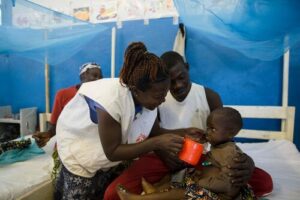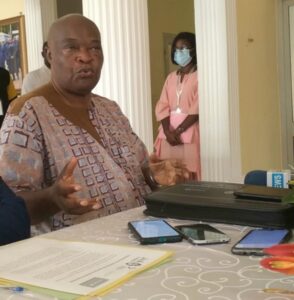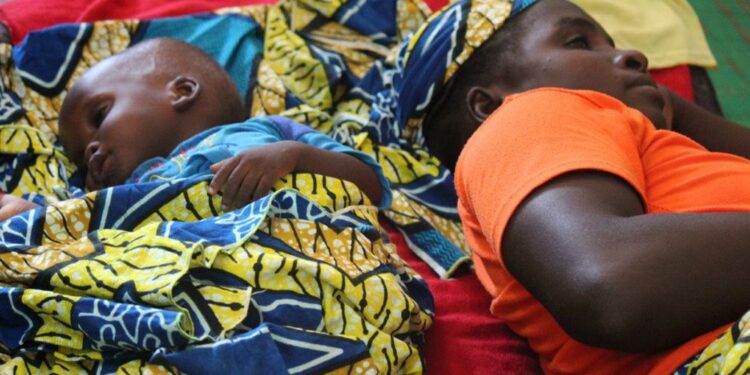Malnutrition is responsible for 38 percent of deaths among children under the age of five in Cameroon, says UNICEF
When Violet Bih, 26, fled the socio-political crisis from North Western Cameroon to Yaounde, capital of the tropical Centre Region in 2019, her 8-month-old baby didn’t give her respite with intermittent fever.
Initially, Bih thought her baby’s ill health was associated with change of climate or childhood related illnesses. But when she finally decided to take her baby to the Yaounde Gynaco Obstetric and Pediatric Hospital for consultation, she couldn’t believe what her child was suffering from: acute malnutrition and other complications.
“I remember one night the baby cried throughout untill my neighbour knocked at the door with the husband by 2 am to fine out why,” Bih told News Upfront.

“They advised me to visit a hospital but finances was a challenge for me,” she said.
From September 2006 to March 31, 2015, 17,981 children were admitted in the Yaounde Gynaco Obstetric and Pediatric Hospital. Of this number, 489 presented with Severe Acute Malnutrition (SAM), giving a prevalence of 2.72% in the hospital setting. Similarly, a UN Humanitarian Report shows that in the Far-North region of Cameroon, 8,797 children with Severe Acute Malnutrition were admitted to a treatment center in May 2021.
“People are not totally aware about what they eat and how they should eat” says Professor Julius Oben, co-founder of the Julius and Anne Oben Foundation.
Christa Tabi Arrey, dietician and nutritionist at the Yaounde Central Hospital attributes the problem of malnutrition in Cameroon to causes related to “education and culture.”
“It’s like an insult to Cameroonians when you tell someone that their child is malnourished. But malnutrition is a health problem like any other,” Arrey revealed.
Besides the drugs given to her, Bih, was advised by the doctors to always feed her child with nutritive foods especially fruits.
“I could not respect that because we could barely feed,” she said.
“I was lucky to have a sister who fries and sells “puf-puf” and beans by the roadside, she was the one who would see that we eat, at times “puf-puf” and beans from morning till night, from Monday to Sunday.”
Such stories are sadly not unfamiliar in Cameroon. Bih’s story sums up that of many other Cameroonians, many of which usually go unreported.
“Malnutrition is really not a thing to wish for someone especially a child,” Vivian Abong, 41, told News Upfront.
“My child suffered from malnutrition when she was just two. I was the only one struggling raise her and challenges were enormous,” the mother of two said.
“I remember when she clocked 3, I wanted to enroll her in nursery school, but her weight was not the best, she could not even carry her school bag with a bottle of water inside. I felt bad because she could not play happily with other kids of her age as she will fall at any instance.”
At least 8 million of Cameroon’s 25 million people live below the poverty line—with less than one dollar a day, according to the National Institute
of Statistics.
This narrows the country’s road in achieving Zero Hunger and eradicating malnutrition by 2030 as required by Sustainable Development Goal 2.

Malnutrition is responsible for 38 percent of deaths among children under the age of five in Cameroon according to the United Nations Children Emmergency Fund (UNICEF).
One out of three children is stunted as a result of this phenomenon. The country was ranked 150 out of 189 in the 2019 Human Development Index.
Malnutrition and Hunger, Two Sides Of The Same Coin
Many Cameroonians misconstrue malnutrition to only mean insufficient food supply or intake. Experts however insist there is a fine line between malnutrition and hunger.
“Our bodies have the beautifully orchestrated ability to tell us exactly how much to eat to maintain an ideal weight for our long-term health,” Oben said.
“These signals are what I call true hunger. True hunger is a signal to eat to maintain your muscle mass. Eating to satisfy true hunger does not put fat on our body.” He added.

If true hunger is about how much quantity of food one eats, malnutrition is about how much nutritive food items is consumed. It is also referred to as “Hidden Hunger“, which provokes multiple deficiencies as a result of consuming energy dense, but nutrient-poor diet. Iron, Zinc, Iodine and Vitamin A, are the most frequently limiting micronutrients in the diet.
It is estimated that “Hidden Hunger” affects over two billion people globally, particularly in low and middle income countries including Cameroon where there is a reliance on low staples and where the diet is monotonous, and choices are limited by poverty.
In Cameroon a good number of factors amplify malnutrition, among which are insecurity in different forms.
With 82,454 infections and 1,338 coronavirus-related deaths reported in the Cameroon since the first case was registered on March 6, 2020, malnutrition could only thrive.
How Insecurity Affects Food Security
The Boko Haram insurgency in the Far North region of Cameroon, the political instability in neighbouring Central Africa Republic, and the recent socio-political crisis in the North West and South West regions have disrupted the country’s food chain leading to food security and malnutrition.
“The crisis in the North West and South West regions of the country has forced many to migrate to other regions and man power in agricultural production is greatly reduced,” Yves Tsala, migration expert and President of the Non Governmental Organisation, “Solutions aux migrations clandestines (SMIC)” told News Upfront.
“The security challenges have prevented some important food stuff from reaching the market. Consequently, certain nutritive food items are absent in the market and prices skyrocket making it difficult for the less priviledged to eat balanced diets,” he said.
The food security and nutrition situation in Cameroon remains worrying. In Adamawa Region for instance, food insecurity rose from 19% to 39% within one year. Malnutrition in the Logone and Chari Division of Cameroon’s Far North Region reaced an emergency level according to studies.
The year 2020 marked the mid point of the UN’s Decade for Action on Nutrition (2016-2025)(1). However, the total number of people living with severe food insecurity has continued to rise since 2015 due to persistent crisis in the country.
The Food and Agriculture Organisation (FAO) says all countries currently at high risk of famine also experience significant violent conflict. More than half of all food insecure people live in countries affected by conflict.
Together, conflict and food insecurity can create a vicious cycle, as food scarcity leads to market disruptions, which lead to further decreases in food availability and greater disruptions.
National Advocacy
Cameroon is currently revising its 2006 National Nutrition Policy to incorporate the economic, development and social sectors and decide broader measures to cut malnutrition rates.
“Cameroonian journalists must pressurize the Government to officialize or adopt the national policy elaborated to fight against malnutrition, create a line for the fight against malnutrition in the state budget, persuade local authorities to include the fight against malnutrition in their action plan,” said the country representative of the Helen Keller Non Governmental Organisation, Dr. Ismael Tela.

Cameroon has a good number of Nutrition Ambassadors, among them Mayors and Parliamentarians.
One of them is the former Mayor of Nguelemedouka, Jean Marie Nguele.
“As former Mayor, I understand the functioning of local councils and how they can play a major role in fighting against malnutrition.”
“The fight against malnutrition would soon be on the table of local councils, that is my objective. I intend to sensitize all councils on the need to make nutrition an important aspect of their programmes,” Nguele told journalists during a press conference organised by Scaling Up Nutrition (SUN) movement, in February 2021, at the Julius an Anne (J & A) Oben Foundation in Yaounde.

To professor Julius Oben, collective effort is the best way out in making malnutrition a thing of the past.
“Sixty years after independence, we should not be talking about malnutrition in Cameroon. We should not be talking about malnutrition in 2021,” he said.
It has been observed that the Cameroonian ancestry that consumed only the traditional dishes had longer lifespan than their offspring today.
Fighting Malnutrition in Cameroon
To raise awareness around malnutrition, Cameroon is targeting multiple groups including Parliamentarians, said Georges Okala, Deputy Director of Food and Nutrition in the Ministry of Public Health.
Cameroon’s approach to nutrition advocacy has been born out of a long-term neglect for nutrition in the country. Cameroon is among the 36 countries in the world with the largest number of children under five suffering from stunted growth.
Nearly 33% of children under five suffer from stunting: equivalent to approximately one million children.
Six out of ten children are anaemic (due to iron deficiency). The prevalence of acute malnutrition is 6% across the country and reaches 10% in the northern regions.
In March 2013, the country joined the Scaling Up Nutrition (SUN) movement, which engages governments, the UN, NGOs and researchers to improve nutrition. At that time, Cameroon had established a National Nutrition Task Force in 2008.
There is an Inter-ministerial Committee to Combat Malnutrition, established within Prime Minister’s Office, which has continued its work, though the fruits are yet to be felt by the ordinary Cameroonian. A food and nutrition guide has been produced and validated. A multi-sectoral and multi-stakeholder platform (MSP) is created and brings the different SUN networks together but needs re-energising, to strengthen the current mechanism. The civil society, donor and UN networks have been established while the private sector network is on the verge of being formalised.
There is a Parliamentary Network (Network Root of Life) to combat malnutrition but would be more effective if it had a more detailed road map.
Elected representatives have an important role to play in the fight against malnutrition especially but not limited to endorsing legislation, developing budgets, and auditing the use of budgetary allocations.

Way Foward
It is important to target advocacy at multiple groups (i) journalists, (ii) parliamentarians, (iii) local authorities, (iv) private sector, (v) UN agencies, (vi) civil society.
Information needs to be provided in a simple manner and tailored to the targeted audience. Information about economic losses due to malnutrition is important for a country that is seeking to emerge by 2035.
There is a need to close the gap between theory and reality.
Field visits are important to raise awareness of problems and to provide information about all sectors and determinants of malnutrition.
Local and religious authorities need to be involved in advocacy efforts in the most affected areas.
‘Click HERE to read the Article Online’








